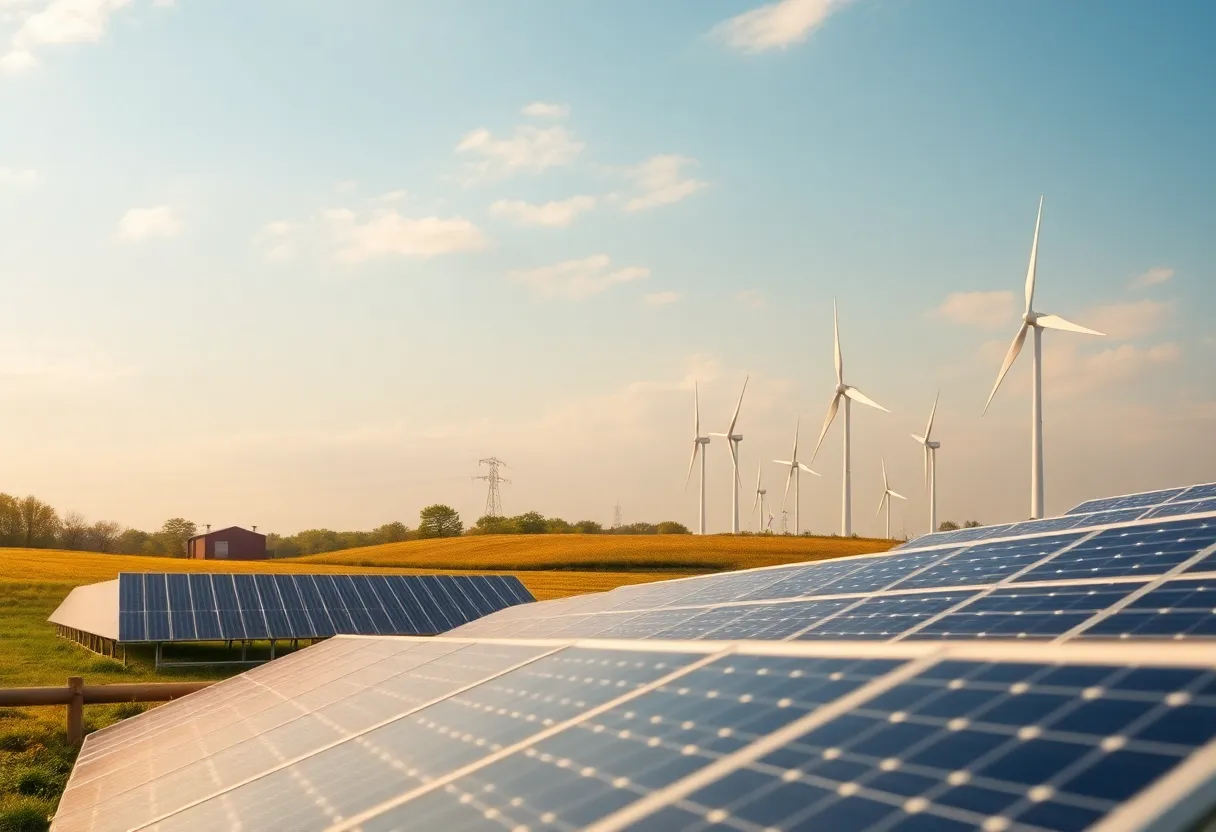Pennsylvania, August 14, 2025
News Summary
In Pennsylvania, renewable energy developers are raising concerns over the impending rollback of tax credits, which could lead to increased consumer costs and slow growth in the renewable energy sector. Experts predict that consumers may face higher electricity bills and significant job losses, with potential declines in the state’s GDP as well. The cuts coincide with a rising demand for energy, particularly as more data centers are established. This situation jeopardizes renewable energy projects and financial stability for schools and nonprofits reliant on these tax credits.
Tax Credit Rollback Threatens Renewable Energy Growth and Raises Consumer Costs in Pennsylvania
Renewable energy developers in Pennsylvania are sounding the alarm about the impending rollback of billions in tax credits for the industry, warning that this could lead to significantly higher costs for consumers. The timing of this rollback coincides with an increasing demand for energy, particularly due to the growing number of data centers being established in the state.
In July, important legislation was signed by the President that extended tax breaks for high-income earners while simultaneously cutting federal funding for Medicaid and other essential social services. This also includes the Biden-era tax credits designed to promote renewable energy projects. Currently, two crucial tax credits—one for construction of clean energy projects and another for generating power with low emissions—are scheduled to expire at the end of 2027, drastically shortening the time frame from nearly a decade to just a few years.
Experts predict that these legislative changes will considerably slow the growth of renewable energy projects in Pennsylvania. As a direct result, consumers could face higher electricity bills, with reports estimating an annual increase of $130 per household by the year 2030.
Furthermore, the Trump administration aims to tighten control over the clean energy industry through new guidelines for the tax credit rollback. Developers are currently able to claim credits for projects that begin construction by the end of 2026 or that commence operations by the end of 2027. Although market demand is surging for companies to claim these credits before they expire, the increased initial investment required may deter future projects in the renewable energy sector.
One solar developer has noted a remarkable uptick in demand, as homeowners are eager to install solar systems ahead of the tax credit expiration at year’s end. Despite these immediate challenges posed by the rollback, there is a belief that the solar sector may continue its long-term growth trajectory, primarily driven by increasing energy demand.
Large-scale energy developers like Vesper Energy expect that financing future projects will become increasingly complicated due to the end of tax credits. With plans to initiate construction on a solar farm in Bradford County, Vesper Energy aims to meet the deadline for these credits.
Competitive Power Ventures states that while tax credits will naturally affect financing decisions, they do not completely halt overall investment figures in the energy sector. However, as electricity prices rise due to a supply-demand imbalance, the elimination of tax credits could further destabilize the growth of the renewable energy industry.
The Mid-Atlantic Renewable Energy Coalition raises concerns that the increasing demand for energy alongside mounting costs will have lasting implications for consumers due to the tax credit rollbacks. The Defend Solar Manufacturing USA Alliance estimates that cutting solar energy tax credits could lead to over 4,000 job losses in Pennsylvania alone, with approximately 330,000 jobs at risk nationwide.
According to estimates from the Energy Innovation think tank, these changes could also elevate electricity rates in Pennsylvania by 6-11% for all consumers. Moreover, a bill dubbed the One Big Beautiful Bill Act could lead to significant economic losses, with forecasts suggesting annual declines of $2.3 billion in the state’s GDP by 2030.
Educational institutions, houses of worship, and nonprofit organizations reliant on federal clean energy tax credits may struggle to finance solar projects, undermining their energy independence and potential cost savings. The implications of this legislation threaten vital planned investments in clean energy throughout Pennsylvania, particularly for public schools that have relied on funding for solar projects. Reports indicate that without these tax credits, schools could lose tens of millions needed for projects that benefit their communities.
In summary, the potential loss of jobs could reach as high as 16,000 by 2030 and 21,000 by 2035 due to these legislative changes. As Pennsylvania grapples with the implications of tax credit rollbacks, the future of solar energy projects, alongside education and service sectors, hangs in the balance.
FAQ Section
What is the tax credit rollback?
The tax credit rollback refers to the expiration of tax incentives that encourage clean energy projects and the generation of power with low emissions, which risks increasing costs for consumers.
How will this affect consumers in Pennsylvania?
Consumers could face higher electricity bills, with estimates suggesting an annual increase of about $130 per household by 2030.
Will there be job losses in the renewable energy sector?
Yes, estimates claim that job losses may reach around 16,000 in Pennsylvania by 2030 and approximately 21,000 by 2035 due to the rollback of tax credits.
What is the potential impact on schools and nonprofits?
Schools and nonprofits that rely on federal clean energy tax credits may struggle to finance solar projects, potentially undermining their energy independence and resulting in significant financial losses.
Key Features of Tax Credit Rollback Impact
- Higher Costs for Consumers: Estimated rise of $130/year per household by 2030.
- Job Losses: Potential loss of 16,000 jobs in Pennsylvania by 2030.
- Impact on Schools: Loss of funding for solar projects critical for community energy savings.
- Electricity Rate Increase: Projected rise of 6-11% for overall electricity rates.
- Economic Losses: Potential GDP decline of $2.3 billion for Pennsylvania by 2030.
Deeper Dive: News & Info About This Topic
Construction PA Resources
Additional Resources
- Pittsburgh Post-Gazette: Pennsylvania Solar Clean Energy
- Solar Power World: Pennsylvania Solar Companies Oppose Tax Credit Cuts
- PennLive: PA Job Losses from Solar Tax Credit Cuts
- Pennsylvania Independent: One Big Beautiful Bill Act and Solar Projects
- Centre Daily Times: Opinion on Renewable Energy
- Wikipedia: Renewable Energy in the United States
- Google Search: Pennsylvania Solar Tax Credits
- Google Scholar: Pennsylvania Renewable Energy
- Encyclopedia Britannica: Solar Energy
- Google News: Pennsylvania Solar Energy





